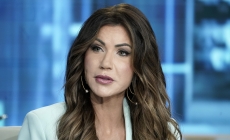-
Kristi Noem Hits Back at Tribal Reservation Bans - May 18, 2024
-
A portion of Mulholland Drive, damaged by mudslides in winter storms, reopens - May 26, 2024
-
‘Maybe You Don’t Want to Win’ - May 26, 2024
-
Donald Trump Putting Law Enforcement in Danger: Attorney - May 25, 2024
-
Avoid the waters of these 5 L.A. County beaches this holiday weekend, public health officials say - May 25, 2024
-
Bawdy Comedy ‘Anora’ Wins Palme d’Or at Cannes Film Festival - May 25, 2024
-
Map Shows Heat Wave Zone Spread Into Five New States - May 25, 2024
-
Azusa police arrest suspected slingshot-wielding vandal - May 25, 2024
-
Donald Trump Hammers Judge Ahead of Jury Instructions - May 25, 2024
-
Sometimes U.S. and U.K. Politics Seem in Lock Step. Not This Year. - May 25, 2024
Kristi Noem Hits Back at Tribal Reservation Bans
South Dakota Governor Kristi Noem has spoken out on Friday after recently being banned from a number of tribal reservations due to previous comments she has made.
The Republican governor who is a close ally to former President Donald Trump, the presumed 2024 GOP presidential nominee, took to X, formerly Twitter, after she was banned by a series of state tribes earlier this year—including two last week—for claiming tribal leaders are “personally benefiting” from drug cartels in the state.
NBC News reported in February that some Mexican drug cartels had created relationships with Native American tribes in Montana as a way to facilitate illegal substances in the state. The report, which cited law enforcement officers and tribal leaders, said that Indigenous women were “often prime targets” of cartel associates, who after forming a relationship use the women’s homes as “bases of operations.”
In March, Noem weighed in on the topic in a forum and spoke about South Dakota and said, “We’ve got some tribal leaders that I believe are personally benefiting from the cartels being there, and that’s why they attack me every day. But I’m going to fight for the people who actually live in those situations, who call me and text me every day and say, ‘Please, dear governor, please come help us in Pine Ridge. We are scared.'”

Photo by John Lamparski/Getty Images
She also made a number of comments on social media claiming that the reservations were a hub for drug cartel activity.
As a result of her comments, she was banned by seven Native American reservations in her state that include: Crow Creek Sioux; Yankton Sioux; Sisseton Wahpeton Oyate; Oglala; Rosebud; Cheyenne River; and Standing Rock Sioux, making her unable to access nearly 20 percent of South Dakota’s territory, according to the Associated Press.
She also faced sustained criticism from tribal leaders. During a council meeting in April for the Cheyenne River Sioux Tribe, chairman Ryman LeBeau called Noem’s statements “gossip and lies about our Lakota students, their parents and our Tribal Councils,” adding that the accusations “perpetuate stereotypes, misconceptions, which are inaccurate and untrue.”
Despite her bans, Noem has continued to post about cartels. On X, she wrote on Friday, “I have been calling out the truth for months, about cartels and their affiliates having a presence on tribal reservations.”
I have been calling out the truth for months, about cartels and their affiliates having a presence on tribal reservations.
But strangely, the South Dakota media has done very little to cover it.@chrishansen is covering it, and he shared his findings with me earlier this week. pic.twitter.com/4yT4926Zgg
— Kristi Noem (@KristiNoem) May 17, 2024
In another post on Friday, she posted a video of statements being made to congressional committees about cartels in reservations and wrote: “Cartels and their affiliates have infiltrated reservations across the nation. This is a very real problem – but it’s not only a South Dakota problem. Democrats, Republicans, and tribal leaders from communities across the nation are speaking out. Don’t take it from me…take it from them.”
Cartels and their affiliates have infiltrated reservations across the nation. This is a very real problem – but it’s not only a South Dakota problem.
Democrats, Republicans, and tribal leaders from communities across the nation are speaking out.
Don’t take it from me… take it… pic.twitter.com/BCmBgS8YR3
— Kristi Noem (@KristiNoem) May 17, 2024
Newsweek has contacted Noem’s office by website form for comment.
Meanwhile, the Trump ally continues to face a backlash after admitting to killing her dog in her new book that was released earlier this month. She was also once tipped to be a contender for Trump’s vice presidential pick, but her numerous controversies have weakened her chances, political commentators suggest.
Christopher Devine, an associate professor of political science at the University of Dayton and author of the book Do Running Mates Matter?: The Influence of Vice Presidential Candidates in Presidential Elections, previously told Newsweek that Noem “didn’t just kill her dog,” but also “killed her chances of becoming Trump’s Vice President.”
“If you’re Donald Trump or one of his advisers, you have to wonder what Kristi Noem might do next to embarrass the campaign or at least cause unwanted distractions. Vice-presidential candidates may not win elections, but they do influence how people see the presidential candidate who—faced with dozens of possible running mates—chose him or her,” Devine said. “If Trump were to pick Noem, after all of this, it may cause voters to question his judgment and how seriously he takes the prospect of running the U.S. government again.”
Uncommon Knowledge
Newsweek is committed to challenging conventional wisdom and finding connections in the search for common ground.
Newsweek is committed to challenging conventional wisdom and finding connections in the search for common ground.
Source link
































